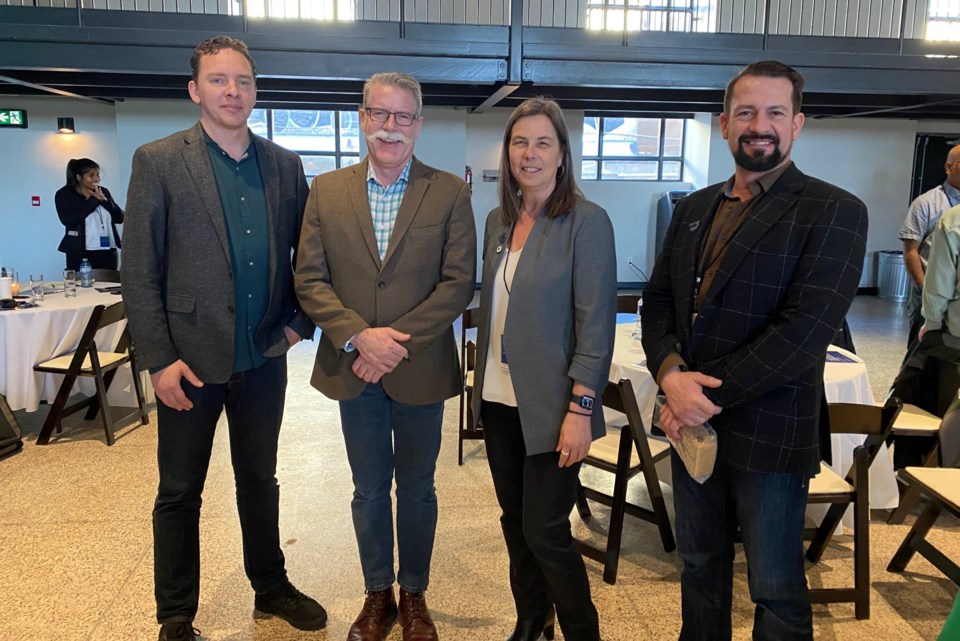Gisele Roberts is confident a Laurentian University-led innovation network, designed to raise awareness about intellectual property rights, has made its mark on Northern Ontario startups.
Announced in spring 2023, The Northern and Rural Innovation Cluster's run, as a one-year pilot project, is drawing to a close.
Comprised of Laurentian in Sudbury, Lakehead University in Thunder Bay, Nipissing University in North Bay, and Trent University in Peterborough, the goal at the outset was to create a pan-Northern roadmap for companies engaged in critical minerals, clean technology and battery electric vehicles to gain access to the professional expertise in the intellectual property (IP) field.
“Part of what we were trying to do was create a presence for IPON (Intellectual Property Ontario) in the North, because we don't have access to a lot of intellectual property resources other than the regional innovation centres,” said Roberts, Laurentian’s director of research and innovation.
“We don't have patent agents in our communities, so we deal with Toronto, Ottawa, and even (IPON) is in southern Ontario, so it’s great to have that connection now.”
IPON is an initiative of the Ontario government that helps companies access resources related to intellectual property.
Intellectual property is often described as intangible — it’s unique knowledge attributed to the inventor behind a creative work. Creators can protect against copycats by developing an IP strategy, which includes the filing of patents.
But it’s a process that’s often misunderstood, Roberts said.
Many entrepreneurs don’t realize that in filing a patent with the government, their proprietary process or technology is published, meaning anyone in the public realm can access it, she said.
Additionally, patents have to be filed for every country in which an entrepreneur wants to sell their product. There’s no such thing as a ‘worldwide’ patent.
It’s also up to the creator to guard against mimics.
“If you get a patent, technically you're supposed to be the only one that can practise that art, but if someone else infringes, then it's on you,” Roberts explained. "The government won't do anything about it; it's up to you to go after that company.
"So you might have spent $30,000 on a patent, but guess what? Now you're going to have to spend $50,000 going after someone who infringes.”
Examples like this are why the Northern and Rural Innovation Cluster was so important, she noted.
The cluster held “IP 101” workshops and meetings to educate startups on the nuance of intellectual property, including one-on-one meetings with patent agents who provided tailored advice and guidance to companies.
Through this initiative, Laurentian was also able to financially support two Sudbury-based organizations: CoreLift and MIRARCO.
CoreLift, created by Eric Maag, is a mechanized rack to hold drill core, enabling field geologists and other mining industry types to move drill core around with greater ease.
At MIRARCO, president and CEO Nadia Mykytczuk is working to create a Centre for Mine Waste Technologies, which would specialize in bioremediation processes to recover metals from mine waste tailings.
“We're using our resources to help (MIRARCO) get the expert advice that they need to create the appropriate IP strategy and documents that they'll need once they become operational,” Roberts said.
The Cluster’s culminating event is set to take place this Thursday, March 7 in Oshawa.
Guest speakers include JP Gladu, principal at the consulting firm Mokwateh, who will speak about economic reconciliation, and Dan Herman, the newly announced CEO of IPON, who will speak about the changing geography of global innovation and what it means for Ontario.
Roberts said they’ll also give an overview of the collective strengths of the Cluster partners and what they can offer startups through the region.
Though the Cluster opted not to seek funding renewal, Roberts said she’s optimistic that other projects can spark from this pilot.
In particular, she’s excited to see Laurentian work with other organizations in the region, with a focus on mining, and she’d also like to work more closely with the City of Greater Sudbury on its Innovation Blueprint.
The document created in 2020 outlines how the city will become more innovative over the next two decades, with an emphasis on critical minerals.
And when it comes to intellectual property, Roberts is optimistic that the ties they’ve created with IPON will mean easier access to IP services for northern companies from now on.
“People in the North frequently feel sort of isolated from services that are offered, door to door almost, in the GTA, and all the big firms are down there,” she said. “So I really hope that there's a bigger presence in the North eventually.”




